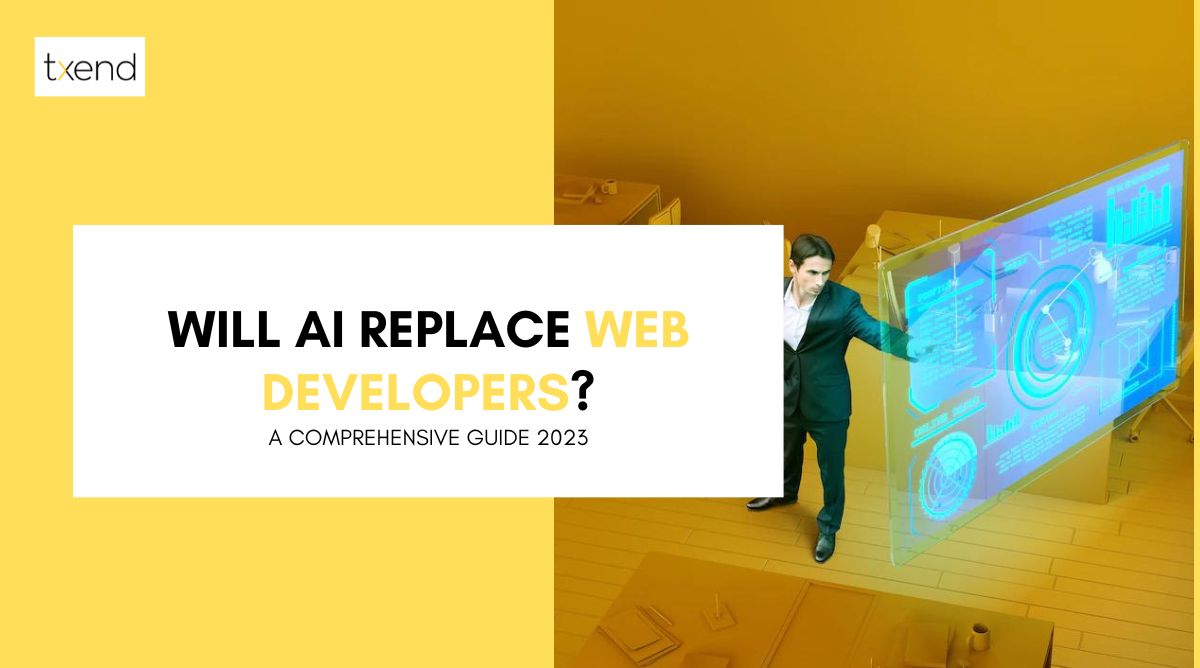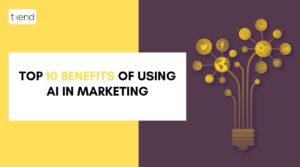Online development is only one of the numerous industries that artificial intelligence (AI) is quickly changing. In recent years, we have seen the emergence of powerful AI tools that can automate many of the tasks that web developers traditionally perform. This has raised worries that web developers may eventually be completely replaced by AI.
However, it is important to note that AI is still in its early stages of development, and it is unlikely to completely replace web developers anytime soon. AI tools can automate many tasks, but they cannot yet replace the creativity, problem-solving skills, and deep understanding of user needs that web developers possess.
Will AI Replace Web Developers?
In this article, we will take a comprehensive look at the potential impact of AI on web development. We will discuss the tasks that AI can automate, the challenges and limitations of AI, and the skills that web developers need to develop in order to remain competitive in the age of AI.
We will also explore the new opportunities that AI is creating for web developers. For example, AI can be used to develop new and innovative web applications, to personalize the user experience, and to improve the security of websites.
By the end of this article, you will have a clear understanding of the role of AI in web development and how you can prepare for the future of work.
Key Takeaways
- Artificial Intelligence (AI) aims to develop intelligent systems that can mimic or replicate human cognitive processes, enabling them to respond and adapt to a range of situations.
- A programmer who creates and manages websites and web apps is known as a web developer.
- Even though artificial intelligence (AI) is still in its infancy, web development is already greatly impacted by it.
- Artificial intelligence (AI) is significantly impacting the web development industry.
- AI technology is rapidly advancing, and new and innovative AI tools and services are always being developed.
What is AI?
A subfield of computer science is artificial intelligence. or AI for short, is the study of creating robots and other systems capable of performing activities that would typically need human intelligence.
These tasks include but are not limited to problem-solving, decision-making, learning from data, natural language understanding, speech recognition, and more.
AI aims to develop intelligent systems that can mimic or replicate human-like cognitive functions, empowering them to react and adjust to a variety of circumstances.
AI systems can be broadly categorized into two main types:
Narrow or Weak AI:
This kind of AI is made to carry out specified duties or address particular issues. It operates within a defined scope and does not possess general intelligence. Examples of narrow AI include virtual assistants like Siri or Alexa, chatbots, and recommendation algorithms on e-commerce websites.
General or Strong AI:
General AI, on the other hand, represents a form of artificial intelligence that possesses human-level intelligence and can understand, learn, and adapt to a wide array of tasks, similar to a human being. Achieving true general AI remains a significant challenge and is the subject of ongoing research.
AI systems rely on various techniques and methodologies to perform their tasks, including:
Machine Learning (ML):
Within the field of artificial intelligence, machine learning focuses on enabling systems to learn from data and improve over time.
It makes predictions or judgments based on the incoming data by using algorithms to find patterns.
Deep Learning:
A subfield of machine learning, deep learning employs artificial neural networks inspired by the human brain. It is particularly effective in tasks such as image and speech recognition.
Natural Language Processing (NLP):
Natural Language Processing is a crucial component of AI that deals with the interaction between computers and human language. It enables machines to understand, interpret, and generate human language, facilitating applications like language translation and chatbots.
AI’s impact and applications extend across numerous domains, including healthcare, finance, transportation, education, and, of course, web development.
Within the realm of web development, artificial intelligence (AI) has the potential to boost process efficiency by automating repetitive tasks and optimizing user experiences.
AI-driven tools can help in website design, content generation, and even optimizing user interfaces. However, it’s important to note that while AI can automate many aspects of web development, it is unlikely to fully replace web developers.
Web developers bring creative thinking, problem-solving skills, and a brief understanding of the specific needs and goals of a project.
They play a critical role in decision-making, architecture design, and ensuring the functionality and security of websites. AI can be a valuable tool for web developers, augmenting their capabilities and streamlining certain tasks, but it does not replace the need for skilled human professionals in the field.
What is a web developer?
A programmer who creates and manages websites and web apps is known as a web developer. With different kind of programming languages and tools, web developers design the front end and back end of websites and web apps.
The front end of a web application website is the part that users see and interact with. Web developers use HTML, CSS, and JavaScript to create the front end of websites and web applications.
The back end of a web application or website is the part that powers the website or web application and handles tasks such as database management, user authentication, and data processing. Web developers write the back-end code for websites and web apps using a range of computer languages, including Python, Java, and PHP.
Additionally, web developers must be well-versed in user interface (UI) and user experience (UX) design. The creation of user-friendly websites and web applications requires careful consideration of UX and UI design.
An essential part of the internet’s evolution is played by web developers. The websites and online apps that we use on a daily basis are made by them.
Here are some of the tasks that web developers typically perform:
- Design and develop websites and web applications
- Write and test code
- Debug websites and web applications
- Deploy websites and web applications to production servers
- Maintain and update websites and web applications
- Troubleshoot and resolve website and web application issues
Web developers are able to operate in numerous settings, including web development agencies, software companies, and in-house IT departments. They can also work as freelancers.
Web development is a growing field, and there is a strong demand for skilled web developers. If you are interested in a career in web development, there are a number of resources available to help you get started, including online courses, boot camps, and degree programs.
The current state of Will AI replace web developers?
Artificial intelligence (AI) is still in its early stages of development, but it is already having a significant impact on web development.
Code creation, design, and testing are among the jobs that AI tools are being utilized to automate. Web developers now have more time to concentrate on the more strategic and creative elements of their profession.
Here are some specific examples of how AI is being used in web development today:
Code generation:
AI tools can be used to generate code for websites and web applications. Web developers may save a ton of time and work by doing this.
For example, the AI tool Copilot can generate code suggestions and complete code blocks based on the context of the code that the user is writing.
Design:
AI tools can be used to design websites and web applications. This can help web developers to create visually appealing and user-friendly interfaces.
For example, the AI tool Figma Design can generate design mockups and prototypes based on user input.
Testing:
AI tools can be used to test websites and web applications for bugs and errors. This can help web developers to ensure that their websites and web applications are working properly.
For example, the AI tool Selenium can automate the testing of websites and web applications.
In addition to these specific examples, AI is also being used to develop new and innovative web development tools and technologies. For example, AI is being used to develop tools that can help web developers personalize the user experience, improve the security of websites, and create more accessible and inclusive websites.
All things considered, AI is benefiting web development. Tasks are becoming more automated thanks to AI tools, which also free up web developers to work on more creative and strategic projects and produce fresh, cutting-edge web applications.
However, it is important to note that AI is still in its early stages of development, and it is unlikely to replace web developers anytime soon completely. AI tools can automate many tasks, but they still need to replace the creativity, problem-solving skills, and deep understanding of user needs that web developers possess.
In the era of artificial intelligence, web developers who embrace AI and acquire the required skills will be well-positioned to prosper.
AI’s possible effects on the web development sector
The web development industry is being significantly impacted by artificial intelligence (AI). Tasks are becoming more automated thanks to AI tools, which also free up web developers to work on more creative and strategic projects and produce fresh, cutting-edge web applications.
Here are some of the potential impacts of AI on the web development industry:
Increased productivity and efficiency:
Many of the time-consuming and repetitive operations that web developers now perform can be automated by AI solutions.
This can free up web developers to focus on more creative and strategic aspects of their work, such as designing new features and improving the user experience.
Improved quality and reliability:
AI technologies have the potential to raise the caliber and dependability of web development.
For example, AI tools can be used to test websites and web applications for bugs and errors and to identify potential security vulnerabilities.
Reduced costs:
AI tools can help to reduce the costs of web development.
For example, AI tools can be used to generate code, design websites, and test websites and web applications. This can save businesses money on web development costs.
New and innovative web applications:
AI is enabling web developers to create new and innovative web applications.
For example, AI is being used to develop web applications that can personalize the user experience, improve the security of websites, and create more accessible and inclusive websites.
Overall, the impact of AI on the web development industry is likely to be positive. AI tools are automating tasks, freeing up web developers to concentrate more on strategic and creative
, enabling web developers to create new and innovative web applications and reducing the costs of web development.
How AI is changing web development?
AI is changing web development in a number of ways. Here are some specific examples:
AI-powered code generation:
AI can be used to generate code automatically based on natural language descriptions or existing code samples. Web developers may save a ton of time and work by doing this, and it can also help to reduce the number of errors in code.
AI-powered testing and debugging:
AI can be used to test and debug code automatically. This can help web developers to identify and fix bugs more quickly and easily.
AI-powered design and prototyping:
Website and web application design and prototyping can be done with AI. This can help web developers to create more visually appealing and user-friendly interfaces.
AI-powered personalization and optimization:
AI can be used to personalize the user experience on websites and web applications and to optimize websites and web applications for performance and SEO.
In addition to these specific examples, AI is also being used to develop new and innovative web development tools and technologies.
For example, AI is being used to develop tools that can help web developers to write more secure code, to create more accessible and inclusive websites, and to develop web applications that can learn and adapt over time.
All things considered, AI is benefiting web development. Tasks are becoming more automated thanks to AI tools, which also free up web developers to work on more creative and strategic projects and produce fresh, cutting-edge web applications.
Benefits of using AI in web development
Increased efficiency:
Many of the time-consuming and repetitive operations that web developers presently perform can be automated by AI. This can allow web developers to concentrate on their work’s more strategic and creative elements.
Reduced costs:
AI has the potential to lower web development expenses. For example, AI tools can generate code, design websites, and test websites and web applications. This can save businesses money on web development costs.
Improved quality:
AI has the potential to raise the standard of web development. For example, AI tools can test websites and web applications for bugs and errors and identify potential security vulnerabilities.
Enhanced creativity:
AI can help web developers to be more creative. For example, AI tools can generate new and innovative design ideas and develop new and innovative web applications.
New opportunities for innovation:
AI is enabling web developers to create new and innovative web applications. For example, AI is being used to develop web applications that can personalize the user experience, improve the security of websites, and create more accessible and inclusive websites.
Challenges of using AI in web development
Here are some specific examples of these challenges:
Lack of skilled AI professionals:
A recent McKinsey study found a need for up to 3 million skilled AI professionals in the workforce. This can make it difficult for businesses to find the people they need to develop and implement AI-powered web applications.
Bias and discrimination in AI models:
A recent study by Stanford University found that AI models used in facial recognition systems are more likely to misidentify people of color and women.
This is because AI models are trained on data, and if the data is biased, the AI model will also be biased. This can lead to AI-powered web applications that discriminate against certain users.
Ethical considerations:
A recent survey by the Pew Research Center found that 72% of Americans are worried about how AI might affect their security and privacy.
This is a valid concern, as AI-powered web applications can collect a lot of data about users. It is important to consider the potential impact of AI on user privacy and security when developing and implementing AI-powered web applications.
The potential advantages of using AI to web development are substantial, notwithstanding these difficulties. Businesses that are able to overcome these challenges and successfully implement AI-powered web applications are likely to gain a competitive advantage.
Factors that will determine the impact of AI on web development
The impact of AI on web development will be determined by a number of factors, including:
The rate of advancement of AI technology:
AI technology is rapidly advancing, and new and innovative AI tools and services are being developed all the time. The faster AI technology advances, the greater the impact it will have on web development.
The cost of AI-powered tools and services:
AI-powered tools and services are becoming more affordable, which makes them accessible to a wider range of businesses and individuals. As the cost of AI-powered tools and services continues to decrease, the impact of AI on web development will increase.
The availability of skilled AI professionals:
There is a shortage of skilled AI professionals in the workforce. This can make it difficult for businesses to find the people they need to develop and implement AI-powered web applications.
As the availability of skilled AI professionals increases, the impact of AI on web development will increase.
The willingness of web developers to adopt AI:
Web developers need to be willing to adopt AI in order for it to have a significant impact on web development. If web developers are resistant to using AI, it will be slower to gain adoption. As more web developers become familiar with AI and its benefits, they will be more likely to adopt it.
In addition to these factors, the impact of AI on web development will also be determined by the specific applications that are developed using AI. For example, if AI is used to develop new and innovative web applications that provide significant benefits to users, then the impact of AI on web development will be greater.
Potential scenarios for the future of web development with AI
Here are some potential scenarios for the future of web development with AI:
AI-powered web development platforms:
In the future, we may see the development of AI-powered web development platforms that can automate many of the tasks that web developers currently perform.
This would free up web developers to concentrate on more strategic and creative elements of their work, like creating new features and enhancing user interfaces.
AI-assisted web development:
AI can also be used to assist web developers with their work. For example, AI can be used to generate code, design websites, and test websites and web applications. This can help web developers to be more efficient and productive.
AI-driven web development:
In the future, we may see the development of AI-driven web applications that can learn and adapt over time. These web applications would be able to personalize the user experience and provide users with the information and services that they need most.
How web developers can adapt to the rise of AI?
There are a number of ways that web developers can adapt to the rise of AI, including:
Upskilling and reskilling:
Web developers can upskill and reskill to learn about AI and how it can be used in web development. This will allow them to take advantage of the opportunities that AI presents and to develop new and innovative AI-powered web applications.
Focusing on high-value tasks:
Web developers can focus on high-value tasks that cannot be easily automated by AI. These tasks include tasks that require creativity, problem-solving skills, and a deep understanding of user needs.
Collaborating with AI:
Web developers can collaborate with AI to develop new and innovative web applications. For example, web developers can use AI to generate code, design websites, and test websites and web applications.
Frequently Asked Questions
AI will not replace web developers in the near future, but it will change the way web development is done. Web developers who embrace AI and develop the necessary skills will be well-positioned to succeed.
Front-end developers build the user interface and user experience of websites and web applications.
Yes, web development can be automated to some extent, but it cannot be fully automated.
AI can automate tasks, generate code, and improve the user experience in front-end development.
AI is automating tasks, freeing up developers to focus on more creative and strategic work.
Conclusion:
As the fast-paced realm of technology continues to advance, the question at the forefront of many discussions remains: “Will AI Replace Web Developers?”
In this comprehensive guide, we’ve delved into the nuances of this pivotal query and explored the dynamics between AI and web development, emphasizing the primary keyword, “Will AI Replace Web Developers.” Let us now conclude this exploration.
The evolution of artificial intelligence has undeniably left an indelible mark on the field of web development.
AI-powered tools and technologies have emerged to streamline certain aspects of web development, automating routine tasks, enhancing user experiences, and optimizing websites.
These tools, driven by predictive AI and generative AI methodologies, are valuable assets that empower web developers to work more efficiently and creatively.
Predictive AI, with its prowess in data analysis and pattern recognition, aids in predicting user behavior and trends. It enables web developers to tailor content and user interfaces, ultimately delivering a more personalized online experience.
Generative AI, on the other hand, opens up exciting creative possibilities, such as generating content, designs, and even code. This innovation amplifies the speed of development and unleashes new avenues for innovation.
However, it’s important to recognize that even if AI can be a strong ally in the field of web development, it probably won’t completely replace human interaction. Web developers are special in that they have a deep awareness of project-specific requirements, creativity, adaptability, and problem-solving capabilities.
They serve as the architects of the digital landscape, shaping websites to meet the needs and goals of businesses and users alike.
The future of web development is a harmonious coexistence between human expertise and AI capabilities. AI can take over routine, repetitive tasks, enabling web developers to focus on strategic thinking, user experience optimization, and innovative design.
Together, they create a synergy that promises even more robust, efficient, and aesthetically pleasing websites.
In the journey of web development, “Will AI Replace Web Developers?” is not a question with a simple yes or no answer. Rather, it invites us to explore the transformative potential of AI in this field.
It encourages us to embrace the opportunities AI presents while remaining vigilant about potential challenges, such as ethical considerations and ensuring the inclusivity and accessibility of AI-driven websites.
In conclusion, AI is a formidable ally for web developers, but it does not signal the end of their role; instead, it augments it.
As we move forward into this AI-driven landscape, it is crucial to embrace these technological advancements with open arms, incorporating them into our web development toolkit while cherishing the unique qualities and insights that only human web developers can provide. The comprehensive guide we’ve navigated here is just the beginning of a journey that promises to be as dynamic and creative as the ever-evolving digital world itself.



